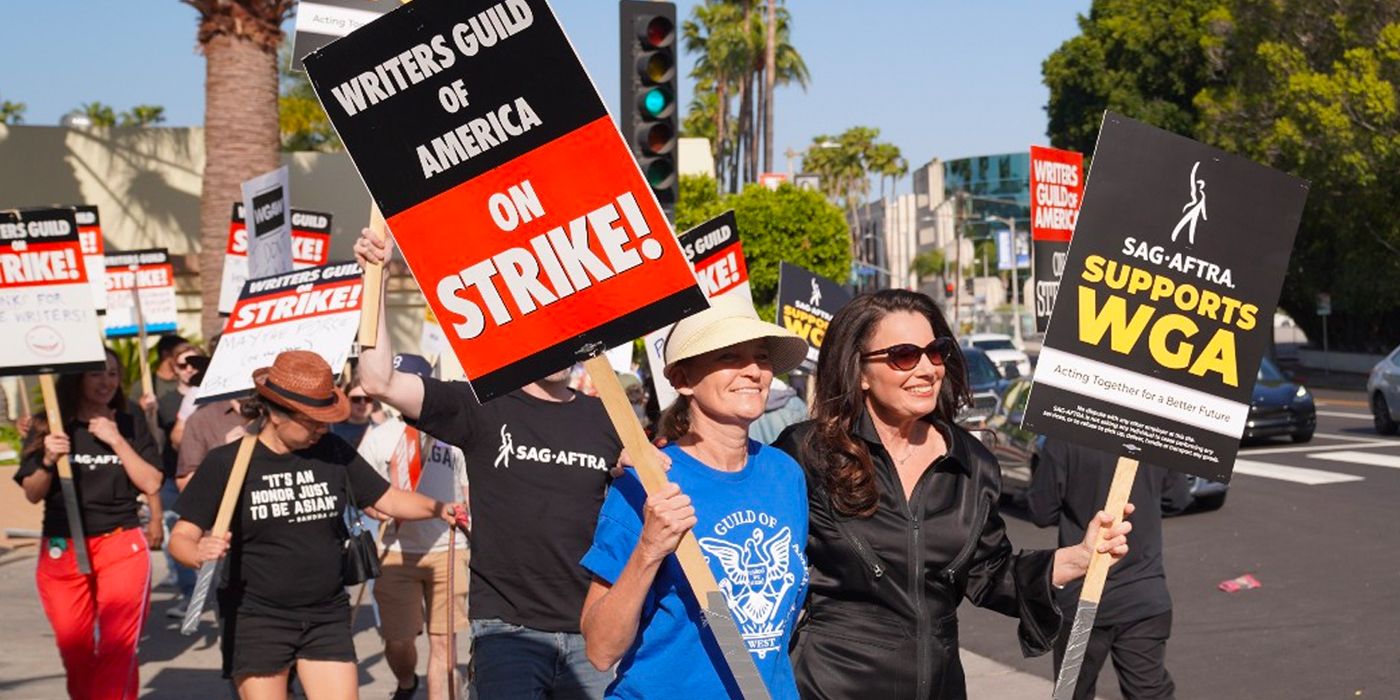WGA And SAG-AFTRA Strike: A Joint Effort To Reform Hollywood

Table of Contents
Key Demands of the WGA and SAG-AFTRA Strike
The WGA and SAG-AFTRA strike is fueled by a multitude of concerns, all stemming from a desire for fairer treatment and a sustainable future for creative professionals.
Fair Compensation and Residuals in the Streaming Era
The shift from traditional television models to streaming platforms has drastically altered the compensation landscape for writers and actors. The lucrative residual payments once guaranteed through syndication and DVD sales have largely disappeared in the streaming era. This has led to a significant decrease in income for many, even those working on hugely successful shows.
- Streaming residuals: The current system offers minimal or no residuals for streaming projects, unlike traditional television where actors and writers received payments each time an episode aired.
- Fair wages: The unions are demanding fair wages that reflect the value of their work, especially considering the increased viewership and profitability of streaming services.
- Residual payments: The fight is centered around securing a fairer share of the profits generated from streaming platforms, mirroring the revenue-sharing models of the past.
For example, a writer on a successful streaming series might receive a single upfront payment, regardless of how many millions of people watch their work. This contrasts sharply with the previous system, where residuals provided a steady stream of income based on repeated broadcasts. The WGA and SAG-AFTRA are pushing for a system that better reflects the success of their work in the streaming environment.
AI and its Impact on Creative Work
The rise of artificial intelligence (AI) presents a significant threat to the livelihoods of writers and actors. The unions are deeply concerned about the potential for AI to replace human creativity, both in writing scripts and generating realistic performances.
- AI in Hollywood: The use of AI in scriptwriting and performance capture raises concerns about job displacement and the devaluation of human talent.
- AI rights: The unions are fighting for safeguards to protect against the unauthorized use of their work to train AI models. This includes ensuring proper compensation and creative control.
- Creative AI: The key issue isn't necessarily the use of AI as a tool but the lack of regulations preventing exploitation and ensuring human oversight in the creative process.
The unions propose strict regulations on the use of AI in the entertainment industry, including ensuring proper compensation for any work used to train AI systems and preventing AI from replacing human creatives altogether. They envision scenarios where AI could be used ethically and responsibly, but not at the expense of jobs and fair compensation.
Improved Working Conditions and Health Benefits
Beyond compensation, the WGA and SAG-AFTRA are demanding improvements to working conditions and health benefits. The current system often leads to grueling hours, inadequate health insurance, and unsafe working environments.
- Working conditions: The unions are pushing for reasonable working hours, limits on excessive overtime, and better overall treatment on set.
- Health benefits: Access to affordable and comprehensive health insurance is a critical demand, particularly considering the often unpredictable nature of employment in the entertainment industry.
- Actor safety: Specific demands address safety protocols on sets and prevention of exploitation or harassment.
- Writer well-being: The pressure and intense workloads faced by writers need to be addressed to improve their mental health and overall well-being.
Actors often face long and irregular hours, with insufficient breaks and potential safety hazards on set. Writers experience similar pressures with demanding deadlines and intense competition, which impacts their mental health. The unions are seeking to create healthier and more sustainable working environments.
The Impact of the Joint Strike on Hollywood
The joint WGA and SAG-AFTRA strike has had a profound and multifaceted impact on the entertainment industry.
Production Halts and Delays
The strike has brought film and television production to a near standstill. Major studios and production companies are experiencing significant financial losses and numerous projects are facing significant delays.
- Production delays: Countless films and television shows are on hold, resulting in missed release dates and financial setbacks.
- Hollywood shutdown: The strike has effectively shut down a large portion of the Hollywood production machine.
- Film production halt: Movie productions, both big-budget and independent, are at a complete stop.
- TV production delays: Television series, both scripted and unscripted, are facing significant delays, impacting broadcast schedules and streaming release calendars.
Examples of affected projects include major studio films, popular network television shows, and streaming series, highlighting the wide-reaching impact of the strike.
Economic Ripple Effects
The economic consequences of the strike extend far beyond Hollywood studios. Related industries are feeling the pinch, including catering, transportation, and numerous local businesses that depend on the entertainment industry.
- Economic impact: The strike is costing the Los Angeles economy millions of dollars daily.
- Hollywood economy: The economic ripple effect is hitting businesses that rely on the film and television industry for their revenue.
- Job losses: Thousands of workers, including crew members, support staff, and local businesses, are experiencing job losses or reduced income.
- Industry ripple effect: The impact extends to tourism, hotels, and restaurants, reflecting the interconnectedness of the Hollywood economy.
Economic impact studies are beginning to emerge, offering estimates of the financial losses incurred by the prolonged strike.
Public Opinion and Support
Public opinion regarding the WGA and SAG-AFTRA strike is largely supportive, with many recognizing the validity of the unions' demands. Social media has played a critical role in shaping public perception and bolstering support for the strikers.
- Public opinion: Polls and surveys show significant public support for the striking unions and their demands.
- Union support: The public generally understands the importance of fair wages and working conditions within the creative industries.
- Social media impact: Social media has been instrumental in amplifying the strikers' message and mobilizing support.
- Strike support: Celebrities, public figures, and everyday citizens have shown their support for the strike through social media campaigns and public statements.
Social media platforms have been flooded with messages of support, while news coverage has largely portrayed the strike as a fight for fair labor practices in the face of industry changes.
Potential Outcomes and Long-Term Implications
The outcome of the WGA and SAG-AFTRA strike and its long-term impact remain to be seen.
Negotiating a Fair Agreement
Successful negotiations hinge on both sides finding common ground. The challenges lie in balancing the studios' financial concerns with the unions' demands for fair compensation and improved working conditions.
- Negotiations: The process of negotiation will be complex and require significant compromise from all parties involved.
- Contract negotiations: The details of a potential agreement will shape the future of labor relations in Hollywood.
- Union agreement: A successful agreement will require both sides to make concessions and compromise on key issues.
- Collective bargaining: The power of collective bargaining will be tested during these negotiations.
The strategies employed by both sides, including potential concessions, will be crucial in determining whether a successful agreement can be reached.
Shaping the Future of Hollywood
The WGA and SAG-AFTRA strike has the potential to fundamentally reshape the landscape of the entertainment industry. The outcome will influence labor practices, compensation models, and the creative process itself.
- Future of Hollywood: The strike is poised to redefine the relationship between studios and creative professionals.
- Industry reform: The demands of the strike could lead to much-needed reforms in the industry’s labor practices.
- Labor practices: The strike has prompted a conversation about fair labor practices and the need for a more equitable system.
- Creative landscape: The outcome could influence how creative content is produced, distributed, and compensated for in the future.
The strike's resolution could lead to significant changes, including new compensation models for streaming content, clearer regulations on the use of AI, and improved working conditions. This could set a precedent for other industries facing similar challenges related to technological advancements and evolving labor dynamics.
Conclusion
The WGA and SAG-AFTRA strike represents a pivotal moment in Hollywood history. The joint effort by writers and actors highlights the urgent need for significant reforms within the entertainment industry to address fair compensation, the impact of new technologies, and overall working conditions. The outcome of this WGA and SAG-AFTRA strike will not only impact the immediate future of film and television production but will also shape the long-term trajectory of the industry, impacting how creative content is produced and compensated for years to come. Understanding the intricacies of the WGA and SAG-AFTRA strike is crucial for anyone involved in or following the entertainment industry. Stay informed and continue to support fair labor practices in Hollywood.

Featured Posts
-
 Offre Exceptionnelle Samsung Galaxy S25 Ultra 256 Go A 953 75 E Top Produit
May 28, 2025
Offre Exceptionnelle Samsung Galaxy S25 Ultra 256 Go A 953 75 E Top Produit
May 28, 2025 -
 Aprils Rainfall Analyzing The Data So Far
May 28, 2025
Aprils Rainfall Analyzing The Data So Far
May 28, 2025 -
 Injury News Ipswich Towns Mc Kenna Cajuste And Others
May 28, 2025
Injury News Ipswich Towns Mc Kenna Cajuste And Others
May 28, 2025 -
 Bethlehem Election 2024 Negative Campaigning Takes Center Stage
May 28, 2025
Bethlehem Election 2024 Negative Campaigning Takes Center Stage
May 28, 2025 -
 Comparatif Samsung Galaxy S25 128 Go Face A La Concurrence
May 28, 2025
Comparatif Samsung Galaxy S25 128 Go Face A La Concurrence
May 28, 2025
